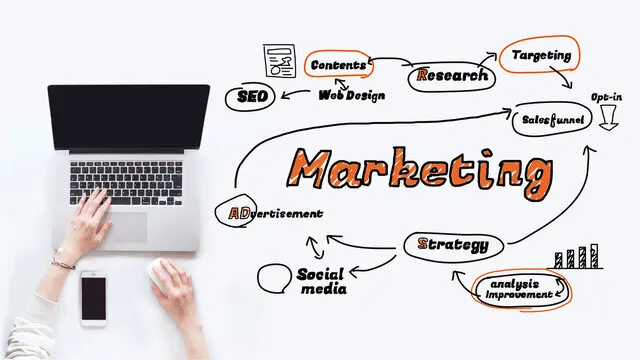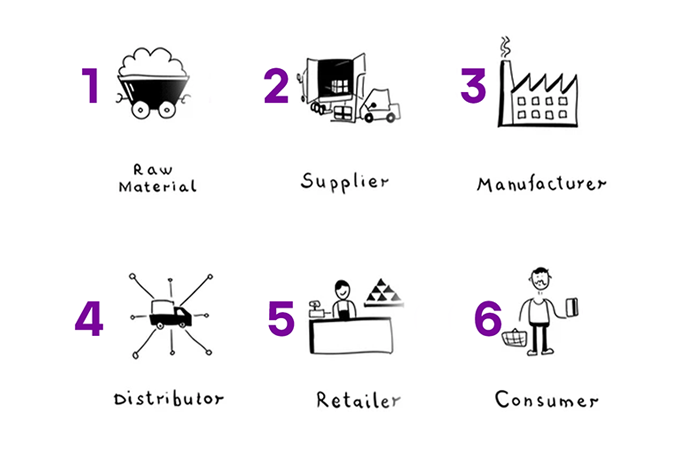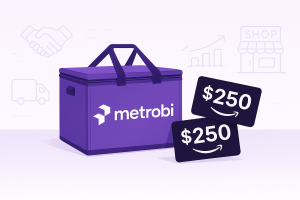Rattle the chains of your traditional wholesale marketing strategies. Ever heard of rattlesnakes changing their rattling rhythm to keep their would-be predators on their toes?
Strange as it sounds, adopting this evolutionary trick in your marketing strategy could make all the difference.
Here’s the truth often ignored in the hustle and bustle of the business world: traditional approaches eventually lose their sting, much like a rattlesnake’s hackneyed warning.
In a world where the ground-shaking figure of $678 billion U.S. dollars represents the montly 2023 wholesale trade sales in the United States alone (that's equivalent to giving every person on earth approximately $85!), the field is saturated and fiercely competitive.
Much like the inventive rattlesnake, there’s a unique, less-trodden path in wholesale marketing just waiting to transform how you do business. Staying relevant means continuously shaking up and redefining your strategies.
Boost customer satisfaction with just a few clicks
Most-Loved Features:
- On-demand drivers
- Real-time GPS tracking
- Delivery confirmation photos
- Over 50% of customers report a smoother delivery experience
Unveiling the Unique Approach to Wholesale Marketing Strategy
– Tap into your target market specifics
– Create a compelling and unique value proposition
Step 1: Understanding Your Target Market
In the wholesale space, recognizing and understanding your target market can propel your business to new heights. Knowing the gist of your potential clients isn’t enough. You need to dig deeper and comprehend their needs, pain points, and what drives them to make purchasing decisions. Explore the importance of accurate wholesale marketing strategies and how implementing advanced technological solutions and streamlining your business processes can significantly impact your success.
Why, you ask? Let’s put it this way: You wouldn’t serve steak at a vegan convention, right? Similarly, having a finger on the pulse of your target audience ensures you deliver solutions that satisfy your potential customer needs – not just what you think they need.
TL;DR: How can you reach this level of understanding?
1. Create buyer personas:
Sketch up profiles of your ideal customers taking into account their demographics, preferences, and behavior.2. Conduct surveys:
Understand your market by directly inquiring about their needs.3. Leverage data analytics:
Use available data from your CRM or other sources for informed decisions.
The more concrete your understanding, the higher your chances of achieving your marketing strategy.
Tips to Understand Your Target Market
You got the ‘why’. Now let’s give you the ‘how’. Dive into social media trends, check out industry forums, and subscribe to industry publications. Knowledge is power and these platforms provide a wealth of data about market trends and customer preferences. Additionally, using social media management can help you track engagement metrics and gather insights on what content or topics your audience likes the most, further enhancing your understanding of market trends.
Also, when crafting your AI product description, don’t underestimate the value of feedback. Encourage it. Use feedback forms, customer service interactions, and follow-up emails. Hearing directly from your client base can often provide the most valuable insights.
A holistic understanding of your target market is the solid foundation on which to build your unique wholesale marketing strategy.
Step 2: Crafting a Unique Value Proposition
Now that you’ve understood your target market, the next move in your power play is to craft a unique value proposition. You could be thinking, ‘What’s that?’
A value proposition, in simple terms, is the reason why a customer should buy from you and not your competitors. It’s a clear statement about the tangible business results customers can expect from using your product, backed up by specific evidence.
No doubt, the wholesale market is saturated. However, a compelling, unique value proposition is your golden ticket to standing out from the crowd. This one statement can effectively communicate how your company fills a need in your target market that no other company does.
📝 Only 8% of customer are satisfied with their experience
A study by Bain & Company found that 80% of companies believe they deliver a "superior experience" to their customers, but only 8% of customers feel the same way. This gap indicates a massive opportunity for differentiation through a unique value proposition.
Examples of Strong Value Propositions in the Wholesale Industry
An example of a robust value proposition in the wholesale industry is from Smith & Associates, an independent distributor of electronic components. Their unique value proposition, “A true partner in your supply chain solution” highlights the company’s commitment to facilitating smooth supply chain operations for their customers – something that their target market deeply values.
Another example is Medline, a global manufacturer, and distributor in the healthcare industry. Their value proposition, “Quality. Service. Value.” hits the nail on the head, clearly outlining the company’s dedication to delivering high-quality products, reliable service, and competitive prices.
When you get your value proposition right, you’ve essentially made an unbeatable promise to your customers—that you’re their best choice.
Stand out. Be unique. Be persuasive. And above all else, deliver what you promise.
Next stop – reaping the benefits.
Metrobi is transforming wholesalers deliveries
Specialized solutions for wholesalers businesses:
- Wholesalers-trained drivers
- Proper handling equipment
- Peak day delivery support
- 23% average cost reduction
Benefits of Implementing a Unique Wholesale Marketing Strategy
- Enhancing market penetration
- Boosting brand recognition and loyalty
Increased Market Penetration
A distinctive wholesale marketing strategy can create pathways to broader client bases and new markets. Potential market penetration becomes virtually limitless when leveraging targeted wholesale marketing methods. With an apt strategy, you can reach out to a wider swath of target audience, thereby facilitating business expansion.
Businesses focus heavily on drawing new customers for their growth. However, receiving new business essentially depends on how well your strategy resonates with the customers. Therefore, cultivating a unique wholesale marketing strategy can aid businesses in tapping into previously unchartered territories, leading to increased market penetration.
A robust wholesale marketing strategy could mean a difference between your business thriving or remaining stagnant. Business owners who overlook this vital aspect potentially miss out on opportunities to significantly increase their market share. Implement a strategic B2B wholesale marketing strategy to captivate more clients and enhance your revenue, securing a competitive edge for sustained growth.
Enhanced Brand Recognition
Conversely, a unique approach to wholesale marketing can lead to enhanced brand recognition and loyalty. When a business has a well-structured marketing strategy, it can curate campaigns and initiatives bound to leave a lasting impression on its target audience. This indelible mark often translates to improved brand recognition.
Customers are more inclined to engage with a brand they recognize and trust. Thus, a unique wholesale marketing strategy can allow your business to stand out among the competition, provide consistent branding, and establish trust with your audience. Having a consistent and distinct brand presence is no small feat in today’s crowded marketplace, and a refined wholesale marketing strategy can facilitate exactly that.
Keeping your brand top-of-mind for your customers is crucial to maintaining customer loyalty. A distinctive approach to your wholesale marketing strategy can ensure your business stays on the tips of the tongues and at the forefront of the minds of your consumers.
The Digital Marketing Institute notes that digital marketing strategies can have a significant return on investment (ROI), with email campaigns often reported as having an ROI of around $40 for every $1 spent, highlighting the efficiency and effectiveness of digital platforms in marketing efforts.
Practical Wholesale Marketing Tactics for Your Strategy
- Digital platforms can significantly improve your wholesale marketing efforts.
- Building robust relationships with retailers is a crucial component of a successful wholesale strategy.
Leveraging Digital Platforms
In today’s technologically driven world, the pivotal role of digital platforms in bolstering wholesale marketing cannot be stressed enough. Engaging with these platforms opens up a wealth of opportunities for improving customer accessibility, scaling operations, and driving business growth.
💸Increased Online B2B Transactions:
A 2022 report by Forrester predicted that U.S. business-to-business (B2B) e-commerce transactions would reach $1.8 trillion by 2023, accounting for 17% of all B2B sales in the country. This reflects the growing shift towards digital platforms for wholesale transactions.
Digital platforms allow for vital reach to potential customers that wasn’t possible earlier. As a modern wholesaler, you could utilize social media platforms, email newsletters, or your very own eCommerce website to reach out to your customers and enhance sales. These platforms have the added benefits of reducing overheads, increasing operational efficiency, and providing robust insights into customer behavior patterns. Interested in boosting your revenue with minimal investment? Explore some innovative wholesale marketing suggestions designed to elevate your business success.
But it’s not just about getting your products in front of a wider audience. Digital platforms also provide an opportunity to create a brand voice and build ongoing customer relationships that extend beyond simple transactions. For a startup looking to grow quickly, using digital tools is important for B2B lead generation, making it easier to find buyers and improve sales plans. Social media, for instance, can be used to grow a loyal following or foster a sense of community among your customers.
Building Strong Relationships with Retailers
At the heart of a successful wholesale marketing strategy lies the building of robust, mutually beneficial relationships with retailers. As wholesalers, fostering a good relationship with your retailers equates to more effective marketing and potentially higher profits.
This starts with understanding the retailer’s needs and ensuring your offerings align with those needs. By doing so, not only do you increase the chances of your products being selected, but you also foster a relationship that breeds loyalty and long-term cooperation.
Invest the time necessary to train your retailers about your products, provide them with adequate marketing support, and maintain open lines of communication. It’s about forging a partnership that can weather the highs and lows of business life. You stand to earn not just profits, but respect, reliability, and repeat business.
Trust plays an enormous part in these relationships. As a wholesaler, you become an essential link in the supply chain – your reliability directly impacts the retailer’s ability to serve their customers. Delivering promises promptly and ensuring high-quality goods can foster a sense of trust that forms the basis for a strong, enduring relationship.
🫱🏼🫲🏾Trust and Reliability:
In a survey by Edelman, 81% of B2B buyers stated that they need to trust a brand before making a purchase decision (Edelman Trust Barometer, 2021).
Bear in mind, that these tactics don’t operate in isolation. Strengthening digital platform usage and nurturing consumer relationships are just the beginning; there are other channels to explore in your overall wholesale marketing strategy.
Choosing the Right Wholesale Marketing Channels
TL;DR: How to choose the right channel?
1. Understanding traditional versus digital wholesale marketing channels is key
2. There are different benefits to both traditional and digital channels
3. Choosing the right channels for your business can tremendously drive your wholesale marketing success.
Traditional Wholesale Marketing Channels
Trade shows, face-to-face interactions, and direct mail are all deeply entrenched within the fabric of traditional wholesale marketing channels. Each has demonstrated consistent effectiveness. Trade shows and face-to-face meetings offer an unrivaled opportunity to establish genuine relationships and showcase your products firsthand.
Direct mail, on the other hand, can work wonders in creating a personal touchpoint, sparking interest, and driving follow-up actions. In a digital age, it can create a unique, tactile impression that digital channels can’t replicate.
Direct mail works!
The Data & Marketing Association (DMA) reported that direct mail has a median ROI of 29%, demonstrating its effectiveness in sparking interest and driving follow-up actions (DMA, 2020).
However, these channels may involve higher costs, more time, and require larger teams to manage. But, it’s undeniable that for many businesses especially B2B, traditional channels have proven irreplaceable.
Digital Wholesale Marketing Channels
Now, onto the digital realm where the possibilities are vast from email marketing to social media advertising. SEO to content marketing, digital channels have transformed the wholesale marketing landscape.
Digital channels offer advantages such as lower costs
💲Digital marketing costs less
The spending on digital marketing is expected to increase by 13.59%, while traditional advertising spending is anticipated to grow by only 0.55% in the same period. This reflects the growing importance of digital marketing in the modern business landscape and the expectation that digital strategies will continue to dominate marketing budgets.
Email marketing campaigns with Gmail, for instance, offer your business an incredible ROI potential, alongside the ability to curate personalized content and automation. Similarly, SEO and content marketing work hand in hand to drive organic traffic to your website and position your business as a thought leader.
This isn’t entirely to suggest that digital is all you need. Rather, a blend of traditional and digital channels, carefully selected to your unique business context and audience preferences, might just be the game-changer in your wholesale marketing strategy — especially when partnering with a saas seo agency.

Evaluating Your Wholesale Marketing Strategy
At the back of every successful wholesale marketing strategy is a robust evaluation framework. As you journey through the wide gamut of traditional and digital channels, it will be paramount to keep a keen eye on their effectiveness.
Performance metrics and customer satisfaction feedback will be your guiding tools to shape a wholesale effective marketing strategy that’s rooted in data-driven decisions and customer-centricity. Your ability to continuously learn, adapt, and fine-tune will pave the way to a wholesale marketing strategy that’s not unique but also sustainable and profitable in the long run.
These insights are just the tip of the iceberg, and there’s much more to uncover. Remember, your wholesale marketing strategy is not a one-size-fits-all; it’s about finding the best approach that meets the unique needs of your business and your wholesale customer relationship management.
Do not settle for traditional wholesale marketing tactics, as the world is rapidly shifting towards digital marketing strategies. Also, don’t undermine the power of traditional channels in building authentic relationships and instilling trust amongst your clientele. Success is in striking a strategic balance. Leveraging the strengths and compensating for the weaknesses. This way, you become the unique approach.
Evaluating Your Wholesale Marketing Strategy
- Key performance indicators specifically for wholesale marketing.
- Importance of regular review and adjustment.
Key Performance Indicators (KPIs) for Wholesale Marketing
Some potential KPIs to consider:
- Customer Acquisition Cost (CAC): This calculation quantifies the resources invested to gain a new customer.
- Customer Lifetime Value (CLV): An estimate of the total gross income from a customer during their relationship with a business.
- Churn Rate: Determines the volume of customers who cease doing business within a given period.
- Average Order Value (AOV): By averaging the total orders over a set timeframe, businesses can establish regular anticipated revenue per order.
- Sales Conversion Rate: This index showcases the percentage of potential leads converted to actual sales.
Regular Review and Adjustment
Regularly reviewing and adjusting your wholesale marketing strategy is pivotal to ensure ultimate potency. The market changes dynamically; without regular evaluation, you risk falling behind.
For instance, if the AOV is not as anticipated, it may trigger a reevaluation of the pricing strategy. Similarly, a high churn rate might indicate dissatisfaction with product quality or customer service, prompting an overhaul of those areas.
Your wholesale marketing strategy isn’t a set-and-forget instrument; it’s a living, breathing entity that requires regular nourishment and attention. Adjustment and adaptation is the only way to sustain your strategy’s effectiveness.
Case Study: XYZ Wholesale Distributors
XYZ Wholesale Distributors, specializing in electronics accessories, faced challenges with:
Low AOV: AOV was below target, impacting revenue per order.
High Churn Rate: A significant number of dissatisfied customers led to a high churn rate.
📈Adjustments & Results:
1. Pricing Strategy: Implementing tiered pricing increased AOV by 20%.
2. Customer Service & Quality: Investments reduced the churn rate by 15%.
Customer Feedback: Regular surveys provided valuable insights, guiding ongoing improvements.
By adapting their wholesale marketing strategy based on data, XYZ Wholesale Distributors achieved tangible improvements in revenue and customer satisfaction, reinforcing the importance of continuous strategy optimization.
Maintaining the review-adjustment-review cycle aids in garnering better results, allocating resources more judiciously, and keeping your finger on the pulse of consumer behavior and market trend changes. Exercise agility in responding to these shifts, and your wholesale marketing strategy will remain consistently effective.
The evaluation of your marketing strategy through KPIs and frequent adjustments isn’t just about improving what you do; it’s about understanding why it matters—the relationship between your actions and your results. By doing so, you drive your wholesale marketing strategy from being merely tactical to being strategically insightful and, ultimately, more impactful.
Stay focused, stay evaluated, stay relevant.
Understanding the Basics of Wholesale Marketing
- Wholesale marketing campaigns primarily pertain to sales transactions between businesses and are vital in the business ecosystem.
- Key distinctions separate wholesale from retail marketing, including target customers and pricing methods.
- The wholesaler plays an instrumental role in the supply chain, assisting retailers with product reach while optimizing the manufacturer’s production process.
What is Wholesale Marketing and how you can use it?
Wholesale marketing involves activities about selling goods or services to businesses, organizations, or other resellers rather than direct customers. It’s more than just bulk selling—it’s about forming strategic partnerships that last within the business ecosystem. At Metrobi, we specialize in offering a service dedicated to managing deliveries for wholesalers, streamlining their distribution process effectively.
Fundamentally, these transactions are instrumental in the overall functioning of a business, because they bridge the gap between production and distribution. They directly influence a product’s reach and customer accessibility. This role illuminates why understanding wholesale marketing strategy is important and the unique approaches it may warrant. Metrobi facilitates these critical connections by offering delivery services across over 20 US cities, encompassing Seattle among others, thus extending a business’s reach and enhancing customer satisfaction.
Expanding your reach is crucial, and that’s where Metrobi’s [Denver courier service](https://metrobi.com/co/denver/) stands out. Metrobi’s efficient and reliable courier solutions in Denver ensure timely deliveries, helping wholesalers maintain excellent service levels and customer satisfaction in a competitive market. Leveraging such localized delivery services can be a game changer for your wholesale operations.
The Difference Between Wholesale and Retail Marketing
While wholesale marketing primarily addresses businesses, retail marketing seeks to attract and convince individual consumers. They’re two sides of the same coin, aiming to get a product from production to consumer—but their tactics, pricing methods, and perspectives differ significantly.
Wholesale marketing often involves negotiations over bulk orders and discounts, prioritizing relationships with a smaller number of big buyers. It emphasizes long-term contracts and quality assurance. On the other hand, retail marketing endeavors to attract individual consumers with an emphasis on advertising, special offers, customer service, and point-of-sale experiences. Our business prides itself in extending delivery services across more than twenty U.S. cities, including offering same-day delivery solutions in Sacramento.
Pricing is another key distinction. Wholesalers tend to sell at lower costs given the volume of their transactions, while retailers often mark up prices to cover operational costs — alongside making a profit.
The Role of Wholesalers in the Supply Chain
The role of wholesalers extends beyond just providing products — they’re an indispensable part of the supply chain machinery. Responsible for acquiring products in bulk from manufacturers, they then sell smaller bulk quantities to retailers, essentially acting as a logistical bridge. Metrobi supports this vital process by offering services that improve the efficiency of wholesale deliveries, ensuring products reach their destinations reliably and swiftly.
Wholesalers also take on risks by storing inventory, enabling manufacturers to focus on their core task of production. By handling storage, distribution, and logistics, wholesalers improve business efficiency, offering valuable services to both manufacturers and retailers.

Brandishing this knowledge of wholesale business marketing aids in a more versatile understanding of business operations. Recognizing different marketing approaches, you can better navigate the intricate landscape of business strategy where every move impacts the next.
Conclusion
A Fresh Spin on the Wholesale Frontier
Mapping out the new terrain of wholesale marketing is no easy task. It requires ditching the perpetuated myths and embracing a more customer-centric mindset, accentuating behavioral segmentation, and, most importantly, adopting a brand enthusiast community.
All these strategies converge into a unique recipe for success, poising your wholesale business for unprecedented growth. It’s about starting the conversations that matter, with the right people, at the right time.
Now, the ball is in your court. You have the pivotal concepts right at your fingertips. It’s time to revolutionize your wholesale marketing approach. Consider these key strategies and integrate them into your business model – you may be surprised at how substantial the impact can be.
Ready to test the waters? Perhaps you might want to start by identifying the passionate brand supporters within your existing customer base. How do you plan to nurture these brand enthusiasts to fuel your onward growth?
So venture forth, brave marketeers, with fresh strategies in hand, let’s reshape the landscape of wholesale marketing together. After all, success starts from within, doesn’t it?














